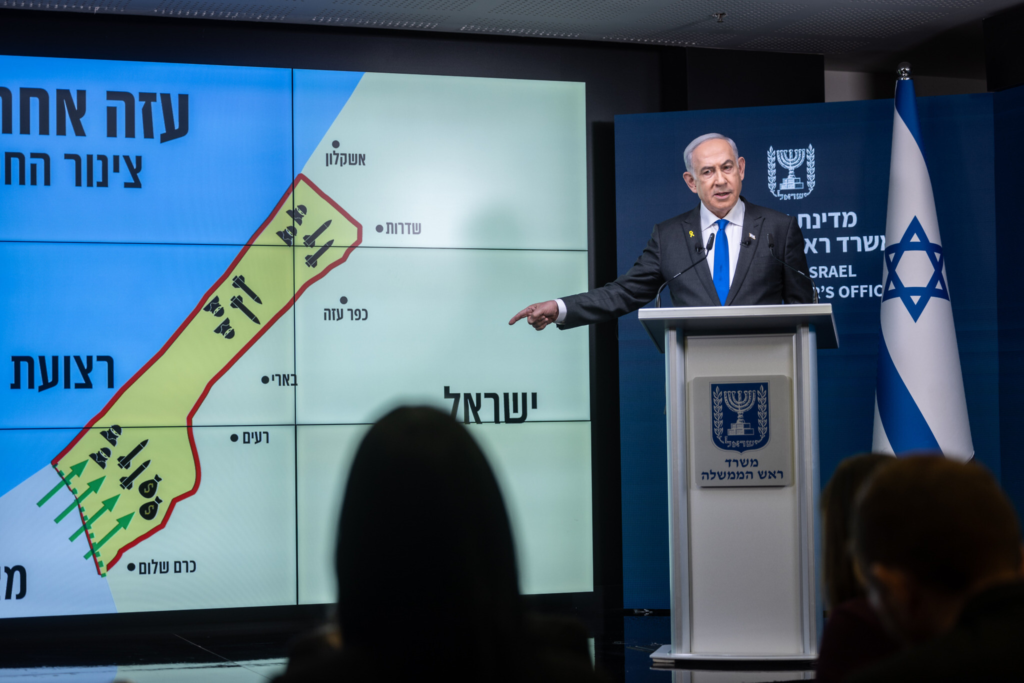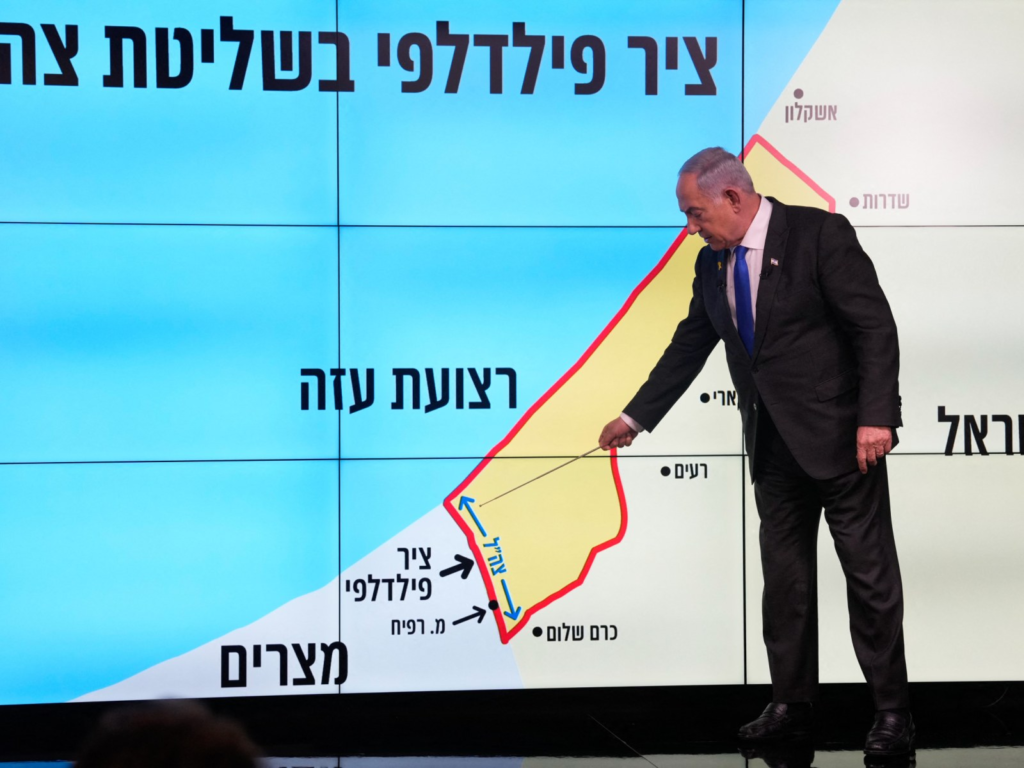The Philadelphia control row has emerged as a focal point in the ongoing conflict between Israel and Hamas, a situation that has drawn global attention due to its complex implications for regional stability. In a recent statement, Israeli Prime Minister Benjamin Netanyahu emphasized that if Israel withdraws, Hamas will return, repeating the devastating events of October 7.
This stance reflects the intense debate surrounding the Philadelphia control row, which has become a critical issue in the Israeli-Palestinian conflict. In this blog, we will explore the background of the Philadelphia control row, Netanyahu’s warnings, and the broader implications for peace in the region.
The Philadelphia Control Row: An Overview
The Philadelphia control row refers to a contentious strip of land along the border between the Gaza Strip and Egypt, known as the Philadelphia Corridor.
This narrow strip, running along the southern edge of Gaza, has been a flashpoint in the conflict between Israel and Hamas for years. It is strategically significant because it serves as a key passage for smuggling weapons and goods into Gaza, making it a focal point for both Israeli security concerns and Palestinian resistance.
The Philadelphia control row has seen various phases of control. Initially, it was under Israeli control following the 1967 Six-Day War, but it was handed over to the Palestinian Authority after the Oslo Accords in the 1990s.
However, following the second intifada and the rise of Hamas, Israel reasserted control over the area to prevent the smuggling of weapons into Gaza. This control has been a source of tension, as Palestinians view it as an infringement on their sovereignty, while Israel sees it as a necessary measure to protect its security.
Netanyahu’s Warning: A Repeat of October 7?
Prime Minister Benjamin Netanyahu’s recent comments regarding the Philadelphia control row have reignited the debate over Israel’s military presence in the area. Netanyahu warned that if Israel were to withdraw from the Philadelphia Corridor, Hamas would quickly regain control, leading to a repeat of the events of October 7, a reference to a significant escalation in violence between Israel and Hamas.
This warning underscores the Israeli government’s belief that maintaining control over the Philadelphia Corridor is essential to preventing Hamas from rearming and launching attacks against Israel.
Netanyahu’s statement also reflects the broader Israeli concern that any reduction in military presence or control over strategic areas like the Philadelphia control row could embolden Hamas and other militant groups.
The fear is that a vacuum of power would allow these groups to regroup, rearm, and potentially launch more deadly attacks on Israeli civilians. This perspective has been a driving force behind Israel’s security policies in Gaza and the West Bank.
The Strategic Importance of the Philadelphia Control Row

The Philadelphia control row’s strategic importance cannot be overstated. For Israel, controlling this area is crucial to preventing the flow of weapons and other military supplies into Gaza. The narrow strip of land has been the site of numerous smuggling tunnels used by Hamas and other militant groups to bring in rockets, explosives, and other weapons.
These tunnels have been a significant challenge for Israeli security forces, who have invested heavily in detecting and destroying them.
For Hamas, the Philadelphia control row represents a lifeline. The tunnels that run beneath the corridor are vital for maintaining their military capabilities and supporting the population in Gaza, which has been under an Israeli blockade since 2007. The control of these tunnels and the flow of goods they enable are seen by Hamas as essential to their survival and ability to resist Israeli pressure.
The ongoing battle for control of the Philadelphia control row is thus not just about territory but about the balance of power in the Israeli-Palestinian conflict. For Israel, maintaining control is a matter of national security, while for Hamas, it is a question of resistance and survival.
The Impact on the Peace Process
The Philadelphia control row has also had a significant impact on the Israeli-Palestinian peace process. The control of this area has been a major sticking point in negotiations, with both sides viewing it as critical to their interests. For Israel, any agreement that does not include guarantees of security in the Philadelphia Corridor is seen as unacceptable.
For the Palestinians, particularly Hamas, any agreement that allows Israel to maintain control is viewed as a continuation of occupation and a betrayal of their cause.
This impasse has made it difficult to reach a lasting peace agreement. The Philadelphia control row symbolizes the broader challenges in the Israeli-Palestinian conflict, where security concerns and demands for sovereignty are often in direct conflict. Without a resolution to this issue, it is hard to see how a lasting peace can be achieved.
Netanyahu’s Stance: A Reflection of Israeli Security Doctrine

Netanyahu’s warning about the Philadelphia control row is not just a rhetorical flourish but a reflection of Israel’s broader security doctrine. This doctrine, which has guided Israeli policy for decades, is based on the belief that Israel must maintain a strong military presence in key strategic areas to ensure its survival in a hostile region.
The Philadelphia Corridor, with its potential to be a conduit for weapons and militants, fits squarely within this doctrine.
The Israeli government’s approach to the Philadelphia control row is also shaped by past experiences. The withdrawal from Gaza in 2005, which was followed by the rise of Hamas and an increase in rocket attacks, is often cited as a cautionary tale.
For many in Israel, this experience reinforces the belief that any withdrawal from the Philadelphia control row would lead to similar outcomes, with Hamas using the area to launch attacks on Israeli civilians.
The Role of the International Community
The Philadelphia control row has also drawn the attention of the international community, which has been involved in various efforts to mediate the conflict between Israel and Hamas. The United Nations, the United States, and other international actors have all played roles in trying to address the security concerns surrounding the Philadelphia Corridor.
However, these efforts have often been hampered by the intractable positions of both sides. Israel’s insistence on maintaining control for security reasons and Hamas’s refusal to disarm have made it difficult to find a compromise that satisfies both parties.
The international community’s role has often been limited to managing the conflict rather than resolving it, with periodic ceasefires and humanitarian aid providing temporary relief but no lasting solution.
The Humanitarian Impact
The Philadelphia control row has had a significant humanitarian impact on the people of Gaza. The Israeli blockade, which is closely tied to the control of the Philadelphia Corridor, has led to severe restrictions on the movement of goods and people. This has contributed to widespread poverty, unemployment, and a lack of basic services in Gaza, creating a humanitarian crisis that has drawn international concern.
For the people of Gaza, the Philadelphia control row represents a symbol of the broader struggle against the Israeli blockade and occupation. The smuggling tunnels, while illegal and dangerous, have been a lifeline for many, providing access to goods that are otherwise unavailable.
The destruction of these tunnels by Israeli forces has only exacerbated the suffering of the population, leading to increased resentment and support for Hamas.
The Future of the Philadelphia Control Row
The future of the Philadelphia control row remains uncertain. As long as the conflict between Israel and Hamas continues, this area will likely remain a flashpoint. Netanyahu’s warning about a repeat of October 7 if Israel withdraws underscores the deep-seated fears that drive Israeli policy in this area.
However, the continued control of the Philadelphia Corridor also comes with risks. The ongoing tension and periodic violence in the area threaten to escalate into a broader conflict, with devastating consequences for both Israelis and Palestinians.
The international community’s efforts to mediate the conflict will be crucial in preventing such an outcome, but finding a solution that addresses the concerns of both sides will be challenging.
The Philadelphia control row is a microcosm of the broader Israeli-Palestinian conflict, encapsulating the competing security concerns and demands for sovereignty that have made peace so elusive. Netanyahu’s warning that Hamas will return if Israel withdraws highlights the high stakes involved in controlling this strategic area.
As long as the conflict continues, the Philadelphia control row will remain a focal point, with significant implications for the future of the region.

